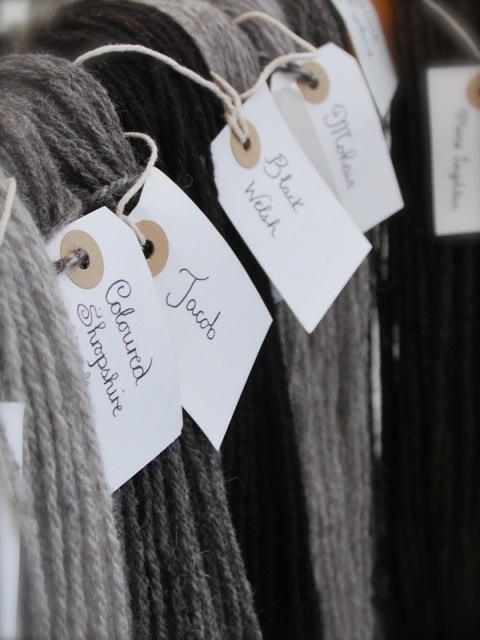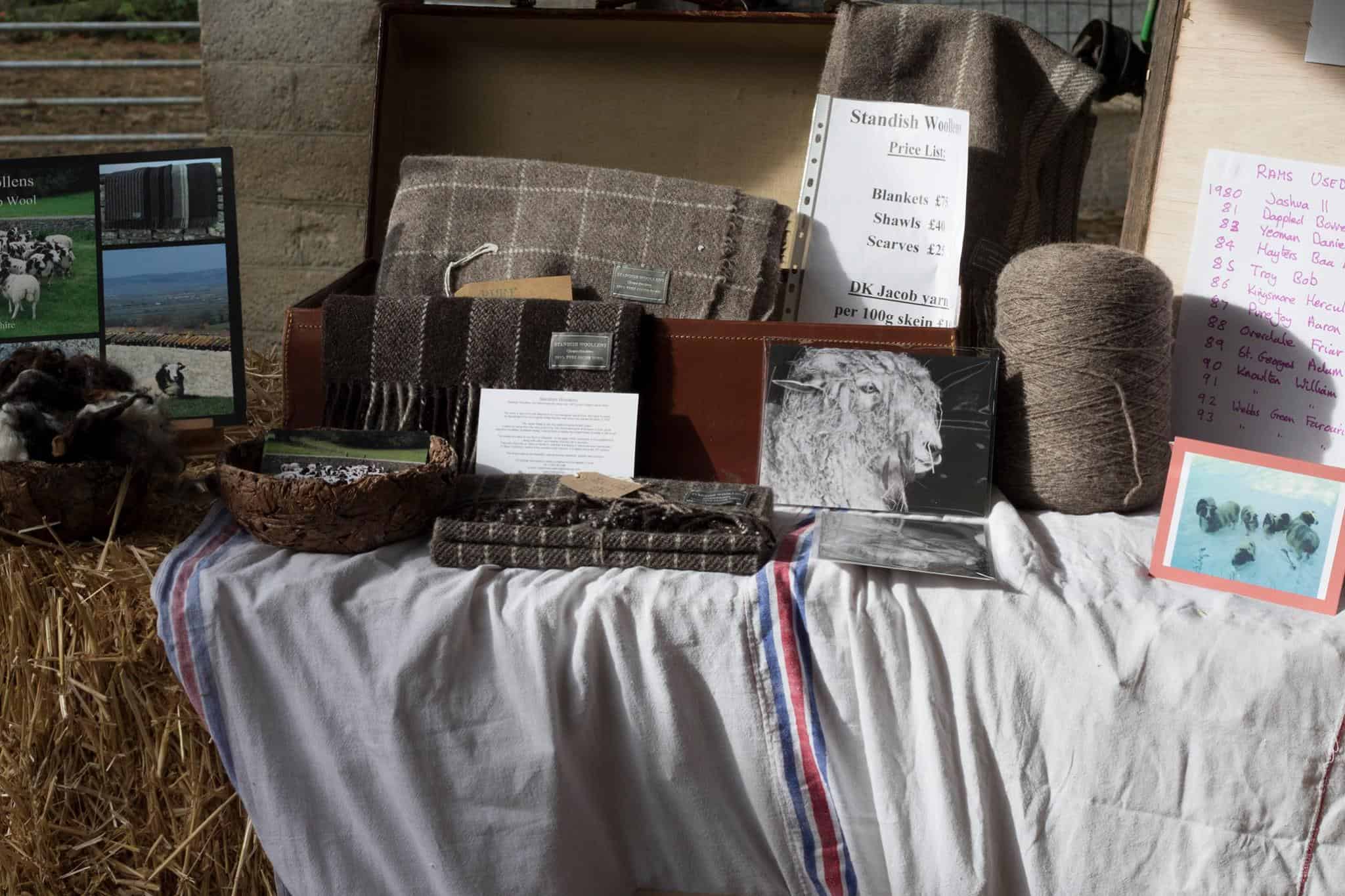Quick Jump Links..
Jacob Wool
The Jacob sheep is classed as an improved breed of coloured sheep. The fleece is popular with spinners and weavers alike and the natural un-dyed colours of its wool make distinctive garments.
There are two colours which make up a Jacob fleece: dark brown and white. The ratio of the two colours varies vastly between sheep and fleeces can range from almost all brown to all white with only small patches of brown.
The fleece of a Jacob is light, soft, springy and open with little lanolin and varies in crimp and fineness. Jacobs are shorn once a year, usually in the spring and the medium-fine wool is sought after by handspinners if it is free of kemp (brittle wool that does not accept dye and also minimises the value and quality of wool). When preparing Jacob fleece for spinning and during spinning itself, the colours of the fleece can be separated or blended to produce a yarn of various shades ranging from nearly all white to grey to nearly all black.
British Wool Marketing Board Grades
- 350 - Selected (Fine) Bradford Count 54 – 58
- Micron Count 25 - 27.5
- 351 – Jacob Bradford Count 46 – 52
- Micron Count 30 – 33
- Staple Length 75mm to 18Omm (3' to 7)
- Good degree of springiness
- Average weight of fleece 2 - 3 kgs (4 - 6 Ibs)
Wool Directory
 The table of contacts below gives the contact details for organisations, groups, societies and individuals who work with wool in a variety of ways.
The table of contacts below gives the contact details for organisations, groups, societies and individuals who work with wool in a variety of ways.
The contacts are all involved with wool either by promoting it, processing wool, producing wool from their own sheep or through the involvement in crafts such as spinning, knitting, weaving, dying or felting.
Many of the contacts in the table below also produce woollen items for sale, provide tuition or run craft workshops. We hope that you find the contacts on this list useful. Please click on the name of the producer to be taken to their website.
| Name | Location | Details |
|---|---|---|
| Organisations, Groups & Societies | ||
| Wool Marketing Board | United Kingdom | The official controlling body of wool marketing. |
| The Association of Guilds of Weavers, Spinners & Dyers | United Kingdom | Large organisation with many local branches. A source of tuition & possibly outlets for your wool. |
| British Coloured Sheep Breeders Association | United Kingdom | Promotes coloured sheep & the use of coloured wool. |
| The Arkwright Spinsters | Sir Richard Arkwright's Cromford Mill, Matlock, Derbyshire | A spinning & fibrecraft group. They meet on the third Sunday of each month between 11.00 am & 4.00 pm. |
| Black Sheep Spinners | Blaze Farm, Wildboarclough, Derbyshire | Informal spinning group. They meet on the third Wednesday of each month. |
| Craft Centres, Tuition & Courses | ||
| Lindsay Roberts | Chesters, Scottish Borders | Handspun yarn, fibres, tuition & workshops. |
| Brenda Howell | Newcastle Emlyn, Wales | Spinning, weaving, dying & felting, wools & woven goods. Demonstrations & illustrated talks. |
| Thelma Jones | St. Clears, Carmarthen, Wales | Studio on a rare breeds farm, local artists on display. |
| Sylvia Sexton | Moylegrove Village, Pemrbrokeshire, Wales | Spinning & weaving equipment, tuition. Craft studio with hand knits & hand woven items. |
| Wingham Wool Work | Wentworth, South Yorkshire | Tuition, fibres, yarns & equipment for sale. |
| The Threshing Barn | Leek, Staffordshire | Tuition, fibres, yarns & equipment for sale. |
| Diane Fisher | North Derbyshire | Tuition, handspun yarns, demonstrations & commissions considered. |
| Processors | ||
| The Natural Fibre Company Ltd. | Launceston, Cornwall | Woollen & worsted spinners, organic processors & dyers. |
| Curlew Weavers | Newcastle Emlyn, Wales | Mill, producers of woollen fabrics & products in tweed. |
| Bobtails | East Riding of Yorkshire | Fleeces & pet hair handpspun & can also be hand knitted. |
| Griffiths' Mill | Derbyshire Dales | Processors of fleece, scouring & carding. Often processed fibre & fleeces for sale. |
| Halifax Spinning Company | Goole, East Riding of Yorkshire | Spinning & processing of fleece. |
| New Lanark Mill | Lanarkshire, Scotland | Processors, spinners & dyers of organic wool. Organic farmers welcome as trade customers. Soil Association accredited |
| Other | ||
| Skye Skyns | Isle of Skye, Scotland | Tanning of sheep skins available upon request |
The table of contacts above who work with wool in various ways are offered here in good faith for the convenience of members. The Jacob Sheep Society does not recommend or endorse any of the contacts.
The Wool Cup
Each year the Jacob Sheep Society has it 'Wool Cup' Competition. The judging of which usually happens at the annual AGM.
Any JSS member or group of members may enter one or more items (or matched sets of items) which demonstrate skillful and imaginative use of Jacob fleece. This means that the outstanding feature of the item must be, or be made from, Jacob fleece.
Any skill can be used to transform the Jacob fleece – knitting, crochet, weaving, spinning, tapestry, felt, embroidery, macramé, fleecy sculptures, fleecy pictures – whatever you chose.
Entries for the Wool Cup do not have to be crafted by a JSS member. Any member can submit items made by a non-member using fleece from the member’s flock.
The Wool Cup event will be divided into two sections. The first section will be for the award of the Wool Cup to the best group of three or fewer items (a matched set counts as one item), selected to represent the Region. Your Regional Contact Member will be able to tell you how the Regional group will be selected.
When the winning group for the Wool Cup has been chosen, the remaining Regional items crafted by a JSS member will be judged alongside the items submitted by individual JSS members. The winner will be presented with the Dutch Cup, and rosettes will be awarded to the highest placed runners-up.
All the Regional and individual entries for the Wool Cup crafted by a JSS member will be judged together for the Lady Aldington Memorial Trophy. This trophy will be awarded to the item that has the most novel, quirky or unusual design.
The Aileen Kennedy Trophy will be awarded for the best skein of Jacob yarn that has been hand spun by a JSS member using fleece from their own flock. The yarn can be any natural Jacob colour, or mix of natural colours, and must be plied – the type of ply is your choice. Up to 10% by weight of another fiber, for example silk, can be included. Additional fiber can be dyed, but the Jacob must be its natural colour.
The event is not only an opportunity to show skill and imagination in transforming Jacob fleece into a decorative or practical item, it’s also an opportunity to get a financial reward. Any item can be offered for sale; as is usual at Society sponsored events, a 10% commission will be deducted from the proceeds of sale.
